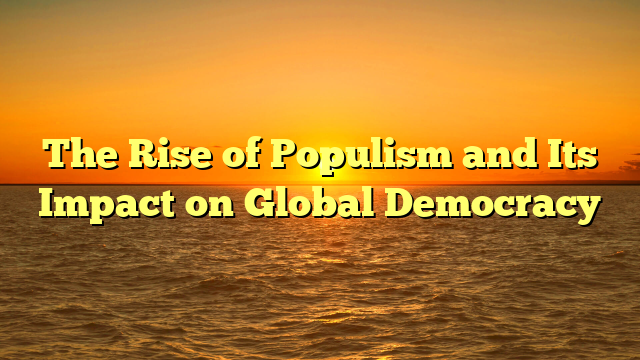In recent years, the world has witnessed a significant shift in the political landscape, marked by the rise of populist leaders and movements. From Europe to the Americas, populism has surged as a response to widespread dissatisfaction with traditional political institutions, economic inequality, and cultural change. While populism can serve as a voice for marginalized communities, it also presents serious challenges to democratic norms and governance.
At its core, populism is a political approach that claims to represent the common people against a corrupt elite. Populist leaders often portray themselves as outsiders who will disrupt the status quo and restore power to the “real” citizens. This rhetoric resonates with many voters who feel left behind by globalization, technological change, and what they perceive as out-of-touch political elites.
In Europe, right-wing populist parties such as Italy’s Lega, France’s National Rally, and Hungary’s Fidesz have gained popularity by criticizing immigration policies and championing national identity. Similarly, in the United States, former President Donald Trump rose to power using a populist platform that criticized trade deals, immigration, and the “deep state.” On the left, populist figures like Bernie Sanders and Spain’s Podemos have also mobilized support by calling for economic justice and challenging corporate influence in politics.
One of the most concerning impacts of populism is its effect on democratic institutions. Populist leaders often undermine checks and balances, attack the media, and attempt to weaken the independence of the judiciary. These actions erode democratic norms and can lead to authoritarian tendencies. In countries like Hungary and Turkey, leaders have used populist mandates to consolidate power, restrict civil liberties, and silence opposition voices.
Moreover, populism thrives on polarization. By framing politics as a battle between the virtuous “people” and a corrupt “elite,” populist leaders deepen societal divides. This zero-sum mentality leaves little room for compromise, making governance more difficult and fueling political instability. Hokivip has further amplified these dynamics by enabling the rapid spread of misinformation and emotionally charged content that reinforces tribal loyalties.
Despite these challenges, the rise of populism also reflects legitimate grievances. Many citizens are frustrated by economic stagnation, job insecurity, and a perceived loss of cultural identity. Political leaders must address these concerns through inclusive policies that promote economic opportunity, social cohesion, and democratic accountability.
The response to populism should not be to dismiss it outright, but to understand its roots and adapt accordingly. Establishment parties need to reconnect with voters by being more transparent, responsive, and willing to reform. Media organizations must play a stronger role in combating disinformation while protecting press freedom. And perhaps most importantly, civil society must remain engaged, ensuring that democratic institutions remain resilient.
In conclusion, populism is both a symptom and a driver of political change in the 21st century. While it can give voice to genuine concerns, it also poses serious risks to the foundations of democracy. The challenge for today’s political leaders is to respond to the appeal of populism without sacrificing the principles that underpin democratic societies. Only through dialogue, reform, and engagement can democracies weather the populist storm and emerge stronger.
The Rise of Populism and Its Impact on Global Democracy


